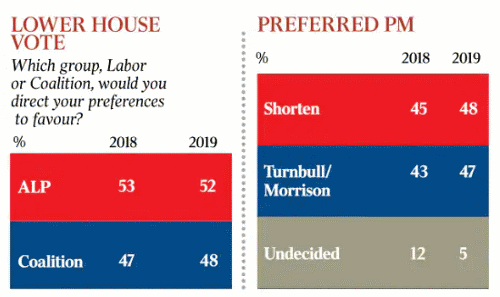Since the previous qualitative poll completed by the Australian Institute for Progress 12 months ago, the Coalition has improved in just about every aspect, apart from its vote against the ALP. That suggests its vote will eventually improve as well. The issues have also moved around in a direction that favours the Coalition.
Our analysis is based on two annual polls of about 1300 Australians who pay attention to politics and are prepared to spend about 15 minutes completing one of our surveys. Their responses tend to be predictive of what average voters will be thinking by election day.
A year ago, Malcolm Turnbull's popularity in the community was reasonable but our respondents had turned off him, with 67 per cent disapproving of his performance, including 35 per cent of Liberal voters, and 82 per cent of One Nation/Australian Conservatives voters.
Advertisement
Those figures change significantly now Scott Morrison is leader. Morrison has disapproval of 53 per cent, which is still not good, but his disapproval among Liberal voters is only 5 per cent and among One Nation/Australian Conservatives voters 24 per cent, improvements of 30 and 58 percentage points respectively.
Bill Shorten's approval figures have also improved over the period: 48 per cent disapprove of him now versus 53 per cent 12 months ago. This reflects a six-percentage-point improvement among Labor voters, 16 among Greens, and 15 among "other" category voters.

Tables courtesy of The Australian
In the end, it makes little difference to preferred prime minister. Twelve months ago, our panel favoured Shorten over Turnbull by 45-43 per cent. Today he shades Morrison 48-47 per cent.
The difference between Turnbull and Morrison is that all sides of the new Prime Minister's own party, and most of the conservative independents, are prepared to accept him.
That is important in electoral terms as it should mean human and financial resources will be easier to marshall. Under Turnbull, resources had dried up, a major reason for his ouster.
Advertisement
Morrison is also viewed differently. Turnbull was seen as urbane but vacillating and weak, and an opportunist who had chosen the wrong party. Morrison may rush to judgment a little prematurely, but at least he makes decisions. He's an opportunist who had the good judgment to be in the right party. He's a marketer who can find the right phrase and who homes in on Labor's weakness. And, somewhat paradoxically, he's a Christian, and that makes him trustworthy in some eyes, as well as all of the above.
Shorten's position has improved over the year. People still don't trust him, but they respect him - that's a similar view to what they had of John Howard as prime minister. And as with Howard, people have known Shorten long enough to become blind to the things they don't like. Greens and the ALP Left would prefer someone else, but this close to the election, they have reconciled.
Shorten has developed policy, and argued it for three years, and he's unified the Labor team. He might not be sincere, but he's dogged and organised. Elections are decided on issues as much as leaders. And here Labor seems to have lost its momentum.
Discuss in our Forums
See what other readers are saying about this article!
Click here to read & post comments.
11 posts so far.